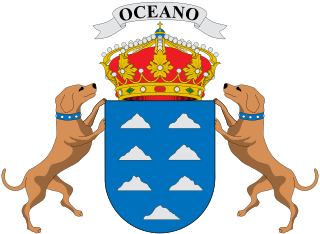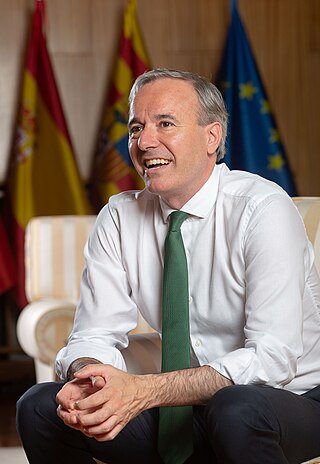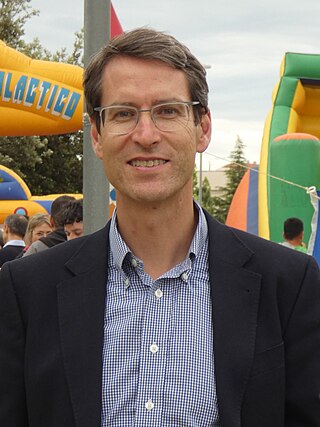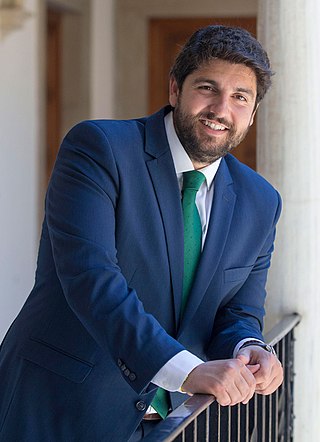
The president of the Community of Madrid is the highest-ranking officer of the Autonomous Community of Madrid and the head of the executive branch. The office is currently held by Isabel Díaz Ayuso of the People's Party.

The President of the Principality of Asturias ; Asturian: Presidente del Principáu d'Asturies) is the head of government of the Spanish autonomous community of Asturias. The president is chosen by the General Junta of the Principality of Asturias, autonomous parliamentary institution.

The president of the Canary Islands is the head of government of the Canary Islands, one of the 17 autonomous communities of Spain, while the monarch Felipe VI remains the head of state as king of Spain.

The president of the Valencian Government is the head of the Generalitat Valenciana, the government of the Spanish autonomous community of Valencia. The president is chosen by the Valencian parliament, the Corts Valencianes.

The President of the Junta of Communities of Castilla–La Mancha, usually known in English as the President of Castilla–La Mancha, is the head of government of Castilla–La Mancha. The president leads the executive branch of the regional government.

The Ministry of Territorial Policy and Democratic Memory (MPTMD), is the department of the Government of Spain which manages the policies of the government regarding relations and cooperation with the Autonomous Communities and with the entities that integrate the Local Administration and those related to the territorial organization of the country and with the Government Delegations and Sub-Delegations in the regions and provinces.

The president of the Balearic Islands is the head of government of the Balearic Islands, one of the 17 autonomous communities of Spain, while the monarch Felipe VI remains the head of state as King of Spain.

The president of the Government of Aragon, also known as the president of the General Deputation of Aragon or, simply, the president of Aragon, is the head of government of Aragon, an autonomous community in Spain. The President is elected to a four-year term by the Aragonese Corts.

The president of La Rioja is the head of government of the Spanish autonomous community of La Rioja. The current incumbent is Gonzalo Capellán of the PP, who has held the office since 29 June 2023.

The president of the Regional Government of Andalusia or, simply the president of Andalusia, is the premier of the devolved government of the Spanish autonomous community of Andalusia. The presidency is one of the three branches of the Regional Government of Andalusia (Junta de Andalucía), the institution whereby the government of the community is organized. The other two branches of are the Parliament of Andalusia and the Council of Government.

The president of the Junta of Castile and León is the executive head of government of the Spanish autonomous community of Castile and León. The president is the head of the Junta of Castile and León, or regional government.

The President of the Region of Murcia, is the head of government of the Spanish autonomous community of the Region of Murcia. Since 2014, no person who has been elected to two terms may be elected to a third.

The Mayor-President of the Autonomous City of Melilla or simply the President of Melilla, is the highest authority of the Spanish autonomous city of Melilla, acting as head of government and as presiding officer of the Assembly of Melilla.

The third government of Adolfo Suárez was formed on 6 April 1979, following the latter's election as Prime Minister of Spain by the Congress of Deputies on 30 March and his swearing-in on 2 April, as a result of the Union of the Democratic Centre (UCD) emerging as the largest parliamentary force at the 1979 Spanish general election. It succeeded the second Suárez government and was the Government of Spain from 6 April 1979 to 27 February 1981, a total of 693 days, or 1 year, 10 months and 21 days.
The president of the Government of Navarre, is the head of government of the devolved government of the Chartered Community of Navarre.

The first government of José Luis Rodríguez Zapatero was formed on 18 April 2004, following the latter's election as Prime Minister of Spain by the Congress of Deputies on 16 April and his swearing-in on 17 April, as a result of the Spanish Socialist Workers' Party (PSOE) emerging as the largest parliamentary force at the 2004 Spanish general election. It succeeded the second Aznar government and was the Government of Spain from 18 April 2004 to 14 April 2008, a total of 1,457 days, or 3 years, 11 months and 27 days.

The seventh government of Francisco Franco was formed on 8 July 1965. It succeeded the sixth Franco government and was the Government of Spain from 8 July 1965 to 30 October 1969, a total of 1,575 days, or 4 years, 3 months and 22 days.

The sixth government of Francisco Franco was formed on 11 July 1962. It succeeded the fifth Franco government and was the Government of Spain from 11 July 1962 to 8 July 1965, a total of 1,093 days, or 2 years, 11 months and 27 days.



























